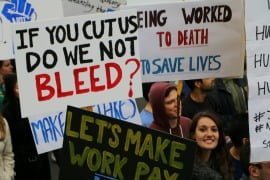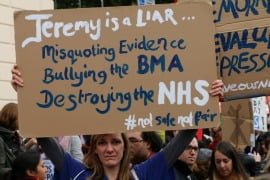At the eleventh hour, Tory Health Secretary Jeremy Hunt has climbed down from provoking the first junior doctors’ strike in British history. Forty-five thousand junior doctors in England were due to take action, beginning today. However, the strike was suspended yesterday evening. Ben Peck analyses the future for the junior doctors’ struggle.
At the eleventh hour, Tory Health Secretary Jeremy Hunt has climbed down from provoking the first junior doctors’ strike in British history. Forty-five thousand junior doctors in England were due to take action, beginning today. However, the strike was suspended yesterday evening.
The junior doctors voted 98% in favour of strike action. With a 76% turn-out, they drove a coach and horses through the Tories anti-trade union bill that restricts the right to strike, and demands 40% of all “key public services” to vote to strike. The first major threatened industrial action by the medical profession for forty years is in response to a 30% real terms pay decrease for those doctors working in the toughest specialities such as accident and emergency, paediatrics, the intensive care unit and acute medicine; contractual safeguarding on shift patterns and patient safety; the definition of unsociable hours.
The BMA website states that they called off the strike after the Health Secretary agreed to drop his threat to impose a new contract on junior doctors “unilaterally”. Acas, a governmental body for averting strikes that masquerades as a nonpartisan mediator, states in its ‘Memorandum of understanding’ that the BMA, NHS Employers and health department are “all agreed that a return to direct and meaningful negotiations in relation to a new contract for junior doctors is the right way forward“.
Both statements, unless backed by determined action, leave open the possibility of a bad compromise. The BMA leadership appear to have taken the option of total rejection and maintenance of the current contract off the table. This would be a mistake. During negotiations, all three planned days of strike are suspended. The BMA has the option to call strike action legally until January 13th.
No middle ground
The crisis of capitalism is opening up a wide ravine in society. On the one side sit the billionaire bosses, sitting on huge stores of capital they will not invest in society due to the lack of profitable opportunities. Next to them sit their stooges, Cameron, Osborne and Hunt. On the other side are the ordinary workers and youth being told they must foot the bill for the crisis of the system. There is increasingly little middle ground.
The convulsions taking place deep in society are drawing in a relatively privileged, formerly conservative layer of the working class. This is dangerous for the directors of the system, who pin their hopes on the passivity of these layers.
There is a reason why Osborne failed to achieve his five-year plan of austerity in the first parliament. Apart from the economic effects, such as the collapse in demand, there are also the social consequences. The Tories’ austerity plan means the most dramatic collapse in living standards since the Second World War. Consequently, even the Tories have stayed their hand, for fear of the social rebellion they fear provoking.
The movement of the junior doctors is a clear warning sign in this direction. It also partially explains the recent turnaround performed by Osborne over tax credit cuts. The Tories are forced by the deep crisis of capitalism to cut and privatise on a far grander scale than Thatcher ever dreamed of, far further than makes political sense, thus undermining their social base. Yet each time doubt enters the restricted minds of the Tories, and they look back over their shoulder, they see the bosses, bankers and their friends in the City of London prodding them along, insisting they stay the course.
The Tories are compelled despite themselves. It is for this reason that the leaders of the strike should have no illusions that they can get anything meaningful from the negotiations which have now commenced. It is only the threat of action by the junior doctors, for whichthere is huge sympathy throughout society, which has caused Jeremy Hunt to step back from the precipice for the time being.
NHS cuts
 This attack also lays to rest any illusion that the Tories are somehow ring-fencing the NHS. On November 27th The Independent reports the findings of the Health Foundation charity, showing that Osborne will cut 20% from the NHS budget over the next five years simply by re-defining services provided by the NHS. Included in this list is health visiting, sexual health, vaccinations and junior doctor training.
This attack also lays to rest any illusion that the Tories are somehow ring-fencing the NHS. On November 27th The Independent reports the findings of the Health Foundation charity, showing that Osborne will cut 20% from the NHS budget over the next five years simply by re-defining services provided by the NHS. Included in this list is health visiting, sexual health, vaccinations and junior doctor training.
An additional complicating factor for the Health Secretary is the social role played by doctors in the hospital. A hospital can be likened to a huge battleship, which is basically a floating factory. On board you have an enormous division of labour, sailors, engineers, mechanics, cooks, cleaners, all under the command of the general staff, the officers. The doctors are the officers of the hospital. They command enormous respect. The other workers; the nurses, physios, therapists, cleaners, even the patients, all suffering under the same regime of austerity, are looking to their example. And they play a similar role in the communities they serve.
Labour’s shadow secretary for health, Heidi Alexander, commenting on the suspension of the strike, has said that “Nobody wanted to see industrial action, not least the junior doctors, so it will be a huge relief to many that common sense has finally prevailed” (Guardian, 1st December). She correctly attacks the Tories by saying that “If Jeremy Hunt had agreed to independent talks when it was first put to him he could have avoided or mitigated any disruption to patients tomorrow“. Far more patients will suffer disruptions if the Tories get their way.
Whether “common sense” has prevailed or not depends on your point of view. Hunt wants to avoid a strike, but is compelled to provoke one. Heidi Alexander says no-one wants a strike, but it is only overwhelming support for strike action that has forced Hunt to think twice. The present situation suits no-one. For economic, social and political reasons the Tories cannot afford to back down. No one has prevailed, but Hunt has bought himself some time.
Reserves of support
The Labour shadow minister should follow the example of the Labour leader. When Jeremy Corbyn visited the TUC in September he stated that he would give support to all workers on strike. Fire fighters, college lecturers, civil servants, teachers: all have come out openly in support of the junior doctors. There are enormous reserves of support that they can rely on in any strike action. Jeremy Hunt knows this.
That is why the Tories have been straining to blacken the name of the junior doctors. But with little impact. They have utilised the services of Professor Sir Bruce Keogh, medical director of NHS England, who wrote a paper earlier this year suggesting that up to “11,000 deaths could be attributed annually to weekend working practices in the National Health Service.” The Daily Mail, quoting a study of Imperial College, reports that infant mortality is 0.09% higher at the weekend. Their answer to this problem is to make the doctors work more unsociable hours at lower pay.
In an attempt to turn the general public against the strike, Hunt claimed up to 20,000 patients would have operations cancelled because of strike action. However, a Press Association snapshot survey reveals that no more than 600 operations had to be cancelled because of strike action. This is who the junior doctors are negotiating with.
For the time being the Tories have averted open confrontation because the Tories cannot afford a militant strike of the junior doctors. But the contradiction they find themselves in is they cannot afford to back down. Hunt hopes to play for time, gambling on the strained nerves and irresoluteness of the workers’ leadership. A great head of steam had beenbuilding behind the junior doctors’ movement. He calculates getting the strike called off at the last minute has been a hit to morale, and that the interval of negotiations will help dissipate the momentum. The leaders should publish the details of the negotiations to keep up the involvement of the rank and file.
Fight the Tories with socialist policies!
At this late stage, calling off the strike was a mistake by the BMA leadership. A show of force with what was sure to be a solid strike would have strengthened the junior doctors’ hand in negotiations immeasurably. But it is not a fatal mistake.
The negotiations will reveal that the Tories have nothing real on the table to offer. They appear determined not to back down. Yet the recent reversal by Osborne on tax credits shows that the Tories understand they are sitting on top of a volcano. A militant and resolute strike can stop the Tories dead in the water. Especially if they appear to be drawing in other layers of workers, in the NHS and in wider society.
But, as the tax credit U-turn also shows, even a victory of the junior doctors won’t stop the Tories’ ultimate plans. They will be compelled by the crisis of the system to look elsewhere for fresh cuts. That means that the junior doctors cannot fight alone in the long run; a general response of the labour movement is needed.
- The Tories are negotiating from a position of weakness – the BMA must not back down!
- Generalise the struggle – continue to build support among other workers, beginning with NHS staff, in preparation for January.
- Fight the Tories, fight capitalism – behind Jeremy Hunt stand the bosses. Fight them by fighting for socialism.






